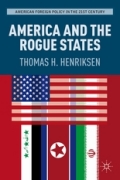
America and the Rogue States traces and examines the policies and interactionof the United States with the main adversarial nations in the post-Cold War era. The book concentrates on the three major rogue states-North Korea, Iran, and pre-invasion Iraq. What are termed as lesser rogue nations-Libya, Syria, Cuba, and the Sudan-receive summarized treatment in one chapter together with a brief discussion about why Afghanistan and Venezuela are not rogues. The author makes clear the distinctions among these confrontational regimes, noting that North Korea, Iran, and Saddam Hussein's Iraq aroused much more anxiety in Washington than lesser rogues and other troublesome states. After an opening chapter placing the rogue-nation phenomenon in historical and current context, the manuscript devotes one chapter each to the three major adversarial rogues. Afinal chapter deals with the less threatening rogue regimes. Each chapter follows a chronological format with description and analysis. The work is intended for a general reader interested in the topic; it also will have appeal as a supplemental text for university classes in international relations covering the period after the Cold War ended. INDICE: The Rogue Phenomenon .Iraq - Rogue State in an Ancient Land .Iran - Ace of Axis of Evil .North Korea - Blackmailing Rogue .Lesser Rogues and Troublesome States.
- ISBN: 978-1-1370-0639-4
- Editorial: Palgrave Macmillan
- Encuadernacion: Cartoné
- Páginas: 240
- Fecha Publicación: 22/06/2012
- Nº Volúmenes: 1
- Idioma: Desconocido
